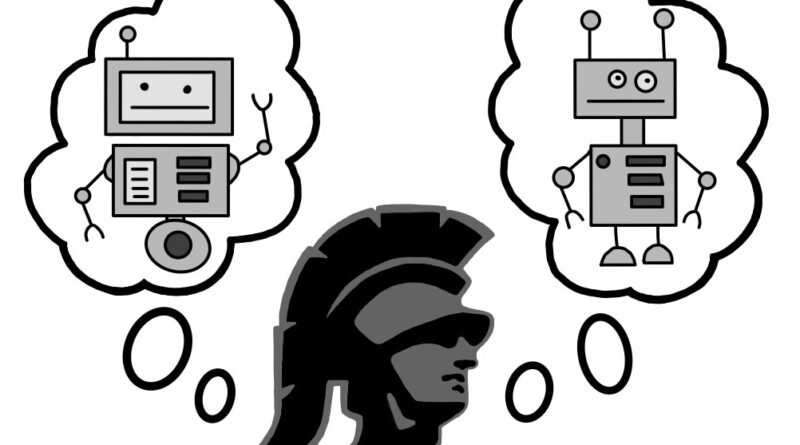CVHS experiences the impact of AI
Artificial Intelligence (AI) is key to efficiency and creativity in the ever-changing technology landscape. It impacts all facets of our lives, including social media interactions, banking, and healthcare. AI has become an ever-present factor in our daily lives, transforming personal and business sectors. Education is one of the industries undergoing this revolutionary wave, as AI integration ushers in a new era of teaching and learning. Just like thousands of high schools across the country, CVHS is experiencing the effects of AI on education.
A significant turning point in educational history has been reached with the accessibility of AI technology, especially with the introduction of ChatGPT in November 2022. With its capacity to comprehend and produce writing that resembles that of a human depending on the input it gets, ChatGPT has given educators and students alike access to a world of opportunities. As per the Pew Research Center, the platform has attracted noteworthy interest and has amassed over 180.5 million users since its launch. This increase in popularity highlights how AI tools are becoming more and more important in our daily lives, especially in education.
“AI is a really useful tool that is truly underutilized in school. It can help form research questions that aid students in familiarizing themselves with a topic. When taught correctly students can use AI in an effective and academically honest way. AI should be taught in schools to be used correctly, rather than banning a tool that can help learning,” said sophomore Chase Coutinho.
The use of AI in education, particularly through ChatGPT and related apps, has revolutionized both the way teachers and students approach education. One interesting tendency that the Pew Research Center brought to light is that about one in five American teenagers who are familiar with ChatGPT have used it for academic purposes. This demonstrates the important impact AI is starting to play in assisting students in their academic endeavors.
According to an Olympian poll, over 50 percent of students have used AI technologies, with 47 percent saying they use ChatGPT the most, suggesting a trend toward using these resources for academic support.
“AI can be very beneficial for teachers too. Even with just creating lesson plans and stuff,” said history teacher Kevin Batchelor.
AI offers teachers the chance to improve their teaching methods, improve administrative work, and understand their student’s learning styles. This may result in a greater focus on hands-on and individual learning. Additionally, AI tools can be very helpful in grading and providing comments, freeing up teachers’ time to create a more creative learning environment.
“AI is something useful but it can also be used in a negative way, you should use it to help you learn but you should not just use it to cheat,” said senior Santiago Soto.
There are significant ethical issues that are brought up by the use of AI in education. With about 52 percent of students responding “No” to whether or not AI should be integrated into school curriculum, there is some obvious apprehension among students. Concerns including data privacy and the possibility of AI reinforcing biases call for strict regulation. Furthermore, in order to successfully manage the potential problems presented by this technology, educators and students must be encouraged to develop critical thinking skills when it comes to AI.
The increasing use of ChatGPT and other AI-powered technologies in education indicates a significant shift in the way that knowledge is learned and communicated. AI has the ability to greatly improve educational outcomes and better prepare students for a future in which technology and the human brain collide, as we stand on the edge of this new era. Adopting AI opens the door to an endless world of learning opportunities.

